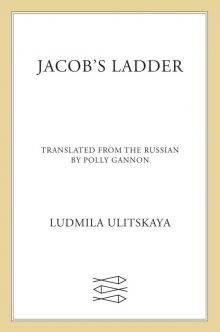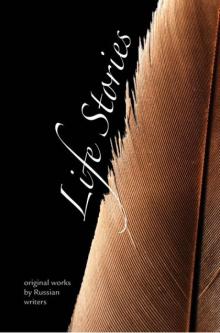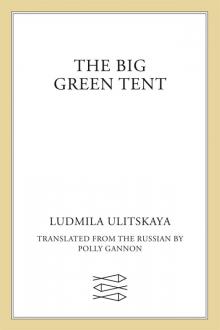- Home
- Ludmila Ulitskaya
Medea and Her Children Page 7
Medea and Her Children Read online
Page 7
He leaned forward, and some of his thick hair, which he combed back, tumbled onto his forehead. His hair really was very attractive.
“He’s going to propose,” Medea surmised.
“I have never been married and, just between ourselves, had no intention of changing that. Only, you see, I had a slight attack yesterday, when we were sitting in that meeting, and purely because you were there it passed off quite without any consequences. Then you came home with me and we sat together all evening and I didn’t feel a thing.”
“He’s so daft it’s comical,” Medea thought, smiling to herself.
“You see,” the dentist battled on, “you really aren’t my type at all …”
Such frankness seemed, even to someone as devoid of flirtatiousness as Medea, to be going too far, but by now she was completely at sea and had no idea where this conversation was leading. Then the dentist made an abrupt turn, as if twisting his molar forceps: “In general I like smaller women, solid, firmly planted, you know, on the ground in the Russian style. No, don’t think I’m a simpleton, I realize that you are something of a princess, but since I was a young man I haven’t been accustomed to looking in the direction of princesses. Laundresses, cafeteria assistants, forgive me, nurses …”
“He is a scream, but I have a pile of laundry at home waiting to be ironed,” she thought. Samuel Yakovlevich speared a piece of the by now cold meat with his fork, hastily chewed and swallowed it, and now Medea could see how nervous he was.
“When you took my hand, Medea Georgievna … No, forgive me, it was I who took your hand, I felt that by your side I feared nothing. The whole evening I felt nothing for you, only that by your side I feared nothing. I escorted you back, then I came back home, lay down, and decided immediately that I must marry you.”
The information left Medea completely unmoved. She was an old maid of twenty-nine and for many years had contemptuously rejected propositions of various kinds made to her by a rather small number of men.
“And then I dreamed of my mother!” he exclaimed dramatically. “If you only knew what a dreadful personality she had, but that’s beside the point. I have never in my life dreamt of her before, but last night I did. She came very close to me, and I could even smell her hair, you know, her old grey hair, and she said to me sternly, ‘Yes, Sam, yes.’ And that was it. I can only think myself that it’s ‘yes.’ ”
Medea was sitting bolt upright. She always did carry herself very upright. Her collar was slightly crumpled on the left, but she did not notice it. She was wondering how to turn this eccentric down gently, so as not to offend him. It didn’t seem to have occurred to him that she might say no.
“Yes, Medea Georgievna, and there is one more thing I should tell you about myself as your future husband. The point is, I am a certified psychiatric patient. That is, I am perfectly all right. It is an old story, but I should nevertheless tell it to you. In 1920, I was drafted into a subdivision of the ChON Special Detachments and sent out to requisition grain. It was a matter of the highest priority, I always understood that. And grain, of course, we duly found in the village of Vasilishchevo in Tambov province. I am quite sure there was grain hidden in every homestead, but we found it in two, which didn’t at all look to be among the richest. We had our orders: anyone found concealing grain was to be shot as an example to others. The Red Army soldiers arrested three peasants and took them outside the village boundary. As they were taking them away, all the people of the village followed. Two of the men were brothers with a shared farm, and the other was an older peasant. Their wives were running after us, and their children. An old paralyzed woman, the mother of the older man, was crawling after us. We took away a hundredweight and a half of grain from them in total, and from the brothers a measly half a hundredweight. There was I, Medea Georgievna, the commanding officer of the grain squad. We lined the three of them up, the Red Army soldiers facing them with their rifles. Well, then the women and the little children raised such a shriek that something struck me in the head and I fell down. I’d had something like an epileptic seizure. After that, of course, I remember nothing. They put me in the cart, right there on top of the grain, and took me back to the city. I was told I turned black, and my arms and legs were like sticks, completely rigid. Three months I was in the hospital, and then they sent me to a sanatorium and then set up a commission and decided that I had weak nerves. After the commission they wanted to transfer me to work for the Party administering the economy, but I had second thoughts and asked them to let me be a dentist. They took my weak nerves into account and released me. You may perhaps have noticed that I am a good dentist. I know the prophylactic side, and all about dentures. I have not changed my Party views, only physically I really am weak. Whenever I need to support a Party decision, my spirit is all for it, but my flesh relapses into weakness and fear that I might be about to have another fit, a nervous fever … like at yesterday’s meeting. I am telling you all this as a very big personal secret, although actually it’s all written down in my medical record. I had an opportunity to have it removed, but I thought, ‘No, I’m not going to. What if the Party were to call me again to do my duty in operational work. I just can’t do it. Shoot me like a dog, but I still can’t do it.’ But I have no other failings, Medea Georgievna.”
Medea then reflected, “God help us, my brother Philip was shot by the Reds; my brother Nikifor was hanged by the Whites, but before that both of them had become murderers themselves. This one couldn’t do it, and he’s lamenting his weakness. Truly, the wind of the Spirit blows where it wills.”
Samuel saw her back to her house. The road glistened dimly beneath their feet. That part of the suburbs was a desolate place then, not built up, and strewn with rubbish. It was about four kilometers to Medea’s house. Samuel, who talked ceaselessly, suddenly fell silent when they were halfway there. He had actually said everything there was to say about himself. In the years of their marriage he only added minor details to what he had told her that evening.
Medea too was silent. He was holding her arm with his thin, strong hand, but she nevertheless had the feeling that it was she who was leading him.
When they reached Harlampy’s old estate, the moon came out, silvering the trees in the orchard; the gates had long ago been barricaded and the house’s residents used two gates at the side and back. They stopped by the side gate. He coughed and asked brusquely, “So, when shall we go to the Registry Office?”
“We shan’t,” she said, shaking her head. “I need to think about it.”
“What is there to think about?” he asked in surprise. “Today we have collectivization of agriculture, tomorrow there will be something else. Of course, life is just getting better all the time, but I think we shall find it easier to get through this wonderful life together, if you see what I mean.”
It was quiet in the house. She took off the grey dress and put on another very similar one for wearing at home. Then she sat down to write a letter to Elena. It was a long, sad letter. She wrote not a word about the comical dentist and his ridiculous courtship but told Elena only about how the boys had grown up and were leaving her; and about how it was night now and she was alone at home, and that her youth had passed, and she was feeling tired.
A wind blew up toward morning, and Medea developed a severe headache. She wrapped an old scarf around her head and lay down in her cold bed. The following day her temperature rose and her joints ached. The influenza was severe and lasted a long time. Samuel Yakovlevich nursed her zealously. By the time she recovered, he was head over heels in love with her, and she felt immeasurably and undeservedly happy: she could never remember anybody bringing her tea in bed before, boiling broth for her, and tucking her blankets in at the sides. After the illness they got married, and their marriage was happy from its first day to its last.
Medea knew his main weakness: after a few vodkas he would start furiously boasting about his revolutionary past and looking victoriously at the women present. Then she would q
uietly get up from the table and say, “Home, Sam!” and he would hurry guiltily after her. It was a small thing, and she forgave him for it.
On the other side of the wall a child started crying—Alik or Liza, Medea couldn’t tell which. A new day was beginning and Medea was unsure whether she had slept that night or not. She had been having ill-defined nights of this sort ever more frequently of late.
The child, and now it was clearly Liza, was demanding to be taken to the seaside right away.
Nike scolded her: “I’m sure I don’t know what all this crying is about! Get up, get washed, have breakfast, and then we’ll decide where we’re going.”
CHAPTER 5
There were two ways to the sea. There was the main road, which had been laid before the war. It wound in a great semicircle past the creek and from there rushed headlong downhill, turning into a difficult path. The main branch of the road climbed uphill to disappear through a barrier, beyond which military installations led an underground life of their own. Another branch of the road went to Theodosia, from where it was often possible to hitch a lift.
The second, old road was a much shorter route, but steeper and more difficult. The roads came together twice: at the creek and at a round meadow between the Upper and Lower Villages. Here a view opened out which was almost more than the eye could bear. The hill on which the Tatars had once built a little village was not all that high, but, as if subordinating itself to some kind of Chinese brainteaser, the scenery here refused necessarily to follow the laws of optics and spread over a broad convex surface, clinging perilously to the point of transition where a plane surface becomes three dimensional, and miraculously uniting one-point with reverse perspective. In one smooth sweep everything was fitted in: the terraced hills once covered with vineyards but retaining them now only at their very tops; the faded table mountains beyond them dotted with the lichen patches of grazing flocks; and higher and farther still, a tremendously ancient mountain massif with leafy forests at its foot, the bald spots of old landslips, and bare, fantastical cliff figures and capricious natural features which seemed like the dwellings of dead boulders at its very summits; and there was no telling whether the stony crust of the mountains was floating in the blue chalice of a sea which encompassed half the horizon, or whether an enormous ring of mountains too large for the eye to see was the vast container of the elongated drop of the Black Sea.
Medea and Samuel found themselves here in the autumn of 1931. Sitting in this meadow covered in capers and grey wormwood, they both had a sense of being at the exact center of the world; that the smooth sweep of the mountains, the rhythmical sighing of the sea, the passing overhead of the clouds, scudding, half-transparent, and the slower ones, more substantial, the vast palpable flow of warm air from the hills, circulating, all in concert engendered a perfect tranquility.
“It’s the hub of the universe,” was all the astounded Samuel could say at the time, although Medea knew several such hubs in the region.
There and then, they decided to move here, exchanging Medea’s Theodosia residence, the two rooms in Harlampy’s house which she had been allotted, for an old Tatar homestead on the very edge of the Village, out on its own. This was the place from which the family’s expeditions to the sea usually set out, often joined by friends living in the Village who had children, and local children too. Preparations were made in advance for these expeditions to the coves, with food, tent poles, and all the other paraphernalia of tourism. Occasionally they spent only one day at the sea, but more often two or three, and would strike camp before sundown in order to negotiate the difficult precipitous path in daylight. They would get home late, carrying the youngest children, already sleepy, on their shoulders. Sometimes they managed to hitch a lift from the creek, but that was only if they were in luck.
Like most of the local people, Medea went to the sea rarely; but unlike the new, recently imported residents, the postwar settlers from the Ukraine, the North Caucasus, and as far away as Siberia, who couldn’t even swim, Medea was born on the seacoast and knew the sea here the way a country dweller knows his own woodlands: all the ways of the water, its fickleness and its constancies, the changing of its colors from morning to evening, from autumn to spring, all the winds and currents together with their calendar periods. When Medea was planning to visit the sea, she preferred to go alone. This time, however, Georgii persuaded her to come along with the rest of them.
It was the holiday period, the hospital was closed, and she couldn’t get out of it. She wrapped a scarf which had once been black but now was bleached almost white around her head and slung an old Tatar bag over her shoulder with her supplies for the trip and her swimming costume.
They locked the house and put the key in a place agreed on many years ago, since unexpected guests were always expected. Nora and Tanya were already sitting at the Hub, both dressed in white from top to toe, and from under Nora’s spectacles a narrow little poplar leaf protruded, just the right size for her nose. Georgii inspected their footwear.
“Right, we’re off!”
The caravan moved off. Artyom walked in front, behind him the beaming Alik with Liza, and behind them the girls in a riot of color, while Georgii and Medea brought up the rear.
On this stretch the road went smoothly downhill and after the first steep descent led them out to Fox Canyon. There had been a stream here once, but like most of the local streams it was long since gone. No one could even remember what it had been called, and it reappeared only for a few days in the year, when the snows were melting, as a trickle of murky meltwater. They walked in semidarkness along the stony bed of the shallow canyon. In its walls, which were clay lower down and rocky farther up, there were numerous fox lairs, a whole ancient city. These lairs were empty now, or had been reoccupied by rather unprepossessing little corsac foxes with pale fur and morose little snouts. Georgii kept looking higher up: his hunter’s eye had never yet failed to spot some kind of small game here.
They came out through Fox Canyon to an old defunct waterfall and turned onto a path which eventually crossed the main road and brought them out to the creek. By now the longer, and easier, part of the journey was behind them, and they called a halt here at a small grassy clearing overgrown with dwarf juniper before beginning the dangerous descent along the precipitous path on the coastal cliffs. This enclosed space, bounded by the cliffs and on one side by the slope of a steep little hill, always had its own pungent and individual smell, a mingling of the scent of juniper with the smells of seaweed, salt, and fish.
They always kept the break here short, in order not to let the heat of the day get to them and make them too relaxed, but just long enough for them to gather their strength before the last leg of the journey. Georgii, without the least pedagogical intention, year after year gave all the family’s children incomparable lessons in the art of survival. He versed the boys and girls in a pagan’s exact and subtle knowledge of how to treat water, fire, and wood. Thus even now Artyom, not the best of his pupils, had squatted down without taking his rucksack off, while Katya was giving the little ones a drink of the boiled water they had brought from home, a small tumblerful to each.
Medea sat with her old legs stretched out. She picked at the soil between the roots of a juniper bush and called to Nike. A tarnished ring with a small pink coral lay in her hand.
“Another find?” Nike asked in delight.
Everybody knew about Medea’s unusual talent. She shook her head. “How shall I put it? A loss, more like. Your mother lost this ring. She thought the sea had washed it away, but here it is.”
She put the simple little ring in Nike’s hand and thought, “Does it still hurt? It seems it does.”
“When?” Nike asked tersely. She guessed she was skirting a forbidden topic, the long-standing quarrel between the sisters.
“The summer of 1946,” Medea replied quickly.
Nike held the ring in her hand, the coral still gleaming pink, but dead. Everybody crowded around, looking into
her hand, as if it really was a living creature that was lying there.
Georgii glanced down over the women’s heads: “Tatar. My mother has one almost exactly the same.”
Katya cast a covetous eye at it. “Mum, can I try it on.”
Masha too held out her hand to take a closer look. It was not a big miracle, but a miracle nevertheless.
Suddenly little Tanya shouted, “Look! Look who it is!”
Someone was hurtling down the steep slope of the hill toward them. He was flying with the speed of a skier, jumping over the occasional bushes, skating over the scree, squatting down, swerving from side to side, braking with one foot then with the other. Before him rushed a cascade of small stones, and behind him rose a plume of dust. His face was invisible beneath the peak of his baseball cap, but Nora immediately recognized him by his white jeans: it was her new neighbor.
Georgii glowered at him. The man was agile, but a poser. Butonov flew, just ahead of a minor avalanche of stones, into the middle of the clearing, jumped up on the spot, and froze like a statue. Then he dusted himself down and, addressing himself to Nora, said, “I saw you from the Village when you were approaching the road, and now I’ve caught up.”
Everyone, including Medea, looked at him with interest, but that was nothing new for Butonov. He took off his cap, ran his hands over his face, and shook them as if they were wet.
“You approached Karatash from the left, then?” Georgii asked briskly.
“Where?” Butonov asked in return.
“This hill,” Georgii said, indicating it with a nod.
“Yes, from the left,” Butonov confirmed.
Georgii knew this inconspicuous path but did not take the children along it, considering the descent with its loose scree too dangerous.
“Who is he? Who is he?” Masha nagged Nike.

 Jacob's Ladder
Jacob's Ladder Life Stories
Life Stories The Funeral Party
The Funeral Party Medea and Her Children
Medea and Her Children The Big Green Tent
The Big Green Tent